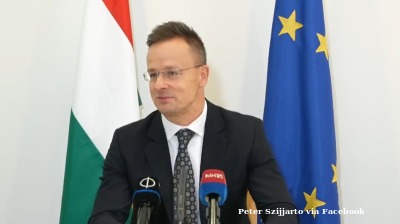EU High Commissioner Josep Borrell announced on March 18 in Ohrid that the leaders of Serbia and Kosovo verbally accepted the implementation annex of the agreement that will lead to normalisation of the relations between the two foes, but did not sign the document.
The marathon session between Serbian President Aleksandar Vucic and Kosovo’s Prime Minister Albin Kurti in North Macedonia, mediated by EU officials, was a follow-up to the high level meeting in Brussels on February 27 when the text of the 11-point normalisation agreement was verbally accepted, but not signed. At the time Borrell said that more discussions are needed on the implementation plan for the agreement.
In Ohrid, Vucic and Kurti first met with Borrell and EU envoy for the dialogue Miroslav Lajcak separately in the Biljana villa, a former residence of Yugoslav leader Josip Broz Tito on the shore of Lake Ohrid, and then held a join meeting. US Deputy Assistant Secretary of State Gabriel Escobar also came to Ohrid as an observer. The marathon meeting sessions in various formats lasted 12 hours and continued into the night, ending after 10pm.
The event attracted huge interest, with more than 200 media crews from North Macedonia, Serbia, Kosovo, the wider region and Europe arriving in Ohrid to witness the outcome of the meeting.
One hour after the meetings, Borrell announced that both sides accepted the annex and agreed to implement all articles in the deal reached at the end of February aimed at normalisation of their relations.
“I am glad to announce that, finally, after 12 hours, we have a deal, we have an agreement on how to do it,” Borrell said.
“This means practical steps on what has to be done, by when it has to be done, by whom and how. It is often said that the devil is in the details, well sometimes the devil is in the calendar, in the schedule, in the timing,” Borrell said.
Speaking concretely about what was agreed, Borrell said that Kosovo has agreed to launch immediately negotiations within the EU-facilitated dialogue on establishing “self-management for the Serbian community in Kosovo”, which is a priority issue for Serbia.
Both sides also agree to deal with missing persons during the Kosovo conflict in 1998-99.
Borrell explained that initially EU officials proposed a more ambitious and detailed plan for the annex, but there was no consent for this proposal.
However Borrell announced that the implementation annex will become an integral and binding part of the respective European paths of the two sides.
“I will launch the work immediately to formally include the relevant amendments in the negotiation chapter 35 of Serbia’s EU negotiation framework, and on the agenda of Kosovo’s special group on normalisation,” Borrell said.
Borrell underlined that the agreement is not just about Kosovo and Serbia, but also concerns the stability and the security of the whole region.
“We will continue working tirelessly until we reach a comprehensive agreement on the normalisation of their relations,” Borrell added.
Annex and agreement without signature
"Today we were supposed to agree on an implementation plan, we reached some sort of agreement, I am satisfied with that, certainly this will not be all, but these few points we have agreed will become part of the negotiation framework, for both parties,” Vucic told journalists after the meetings in Ohrid.
He also said that “nothing ended tonight, but it was just beginning”, referring to the long process that will follow to iron out the details of the implementation plan.
“The EU will assess how much has been done from the implementation plan, which will certainly have to be expanded, although I would not mind if it remains as it is,” Vucic said.
“Again, I didn't sign anything, we made it clear what the red lines are,” Vucic underlined.
Vucic reiterated several times that he won’t accept any talks on Kosovo's recognition and its admission to the United Nations.
Kurti again complained that Vucic refused to sign the annex.
“We have now reached an agreement on an implementation annex to the Basic Agreement. Serbia, just as in the last meeting in Brussels, avoided signing the agreement and now also the annex,” Kurti said.
"Now it's up to the EU to find a mechanism to make the agreement legally & internationally binding,” Kurti said in a tweet.
The EU has been working to facilitate the dialogue between Belgrade and Pristina for years, with the aim of normalising relations and resolving outstanding issues.
Officials said earlier that Ohrid meeting is a historic opportunity to make progress in normalising relations.
The 11-point plan says that Serbia and Kosovo are obliged to develop normal, good-neighbourly relations as well as to respect their independence and territorial integrity.
The agreement does not mention recognition, but it means de facto recognition by saying that the two sides should exchange permanent missions, which will be established at the respective government's seat.
It further says that Serbia should not object to Kosovo’s membership in any international organisations.
Kosovo, a former province of Serbia, unilaterally declared independence in 2008, following the bloody war for independence in 1998-1999. Belgrade still refuses to recognise Kosovo as a separate state, which is the ultimate goal of the authorities in Pristina.
News

Ukrainian military strike for first time disrupts operations of Western oil majors
Drone attack damage caused to Russian gas processing plant forces scaling back of output at Kazakh field partly owned by Chevron, Shell and Eni.
_Foto2_Divulgação_Foresea_(1)_1761062969.jpg)
Petrobras secures controversial Amazon drilling licence ahead of COP30 climate summit
Brazil's Petrobras has obtained authorisation to drill an exploratory well near the mouth of the Amazon River, sparking fierce criticism from conservationists just weeks before Brazil hosts UN climate talks.
_1761050969.jpg)
Revolut clears final hurdle for Mexico banking debut
Revolut has received final authorisation from Mexico's banking regulator to commence operations, positioning the London-based fintech to launch services within weeks.

Hungary to challenge EU’s ban on Russian gas imports, vows to block REPowerEU
Hungarian Foreign Minister Peter Szijjarto says the European Council’s decision to ban Russian fossil fuel imports by 2027 could jeopardise Hungary’s energy security.




